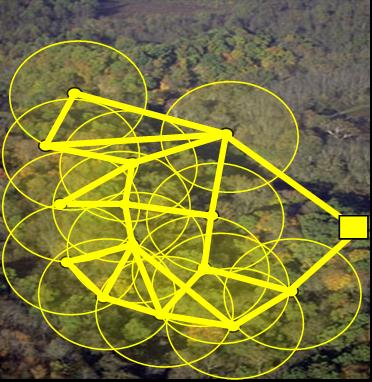Sensing Heterogeneous Information Network Environment (SHINE)
Themes: Sensor network communication, XG - Next Generation Sensing and Communication
How can heterogeneous resources (people, mobile sensors, fixed sensors, social media, information systems, etc.) self-organize for answering information needs?
In our modern society, more and more data is becoming available through technological advances like sensor technology, social media and smartphones. This data can concern a wide variety of aspects of our society, for example environment data like air quality, wind direction, temperature and rainfall, or data about cities like traffic density and parking availability. The scientific challenge that we focus on in this project aims at gathering, processing and interpreting this data for answering information needs. More specifically, we address the following research question: How can heterogeneous resources (people, mobile sensors, fixed sensors, social media, information systems, etc.) self-organize for answering information needs?
Application domain: Environmental monitoring
With the increasing complexity of our modern society - think of heterogeneous social developments projected against a background of economic globalization, urbanization and environmental changes due to climate change - information about our living environment is becoming one the main resources of mankind: we need it to understand and manage the world we live in.Empowerment and commitment of local communities are a necessary pre-requisite to sustain the standard of living in our society. To safeguard the society against abrupt changes and events - severe storms for instance - flexible observation systems are needed to acquire the needed information with the right spatial and temporal accuracy. What could such a system look like?
Consortium and organization
Eleven sections from TU Delft are involved, across three faculties: Faculty of Electrical Engineering, Mathematics and Computer Science (EEMCS), Faculty of Technology, Policy and Management (TPM), and Faculty of Civil Engineering & Geosciences (CEG).
Work packages
- Information Processing for Sensor Swarms
- Integration of Social Data
- Adaptive Coordination and Collection for Mobility
- Resource Negotiation
- Organization Formation
- Interpretation and Visualization of Heterogeneous Environmental Sensor Network Data
For more information, see the project homepage.

Project data
| Researchers: | Geert Leus, Alle-Jan van der Veen, Olexander Yarovoy, Venkat Roy |
|---|---|
| Starting date: | January 2012 |
| Closing date: | December 2015 |
| Funding: | 1000 kE; related to group 200 kE |
| Sponsor: | TU Delft DIRECT |
| Partners: | TU Delft: Fac. EEMCS, Fac. CEG, Fac. TPM |
| Contact: | Alle-Jan van der Veen |